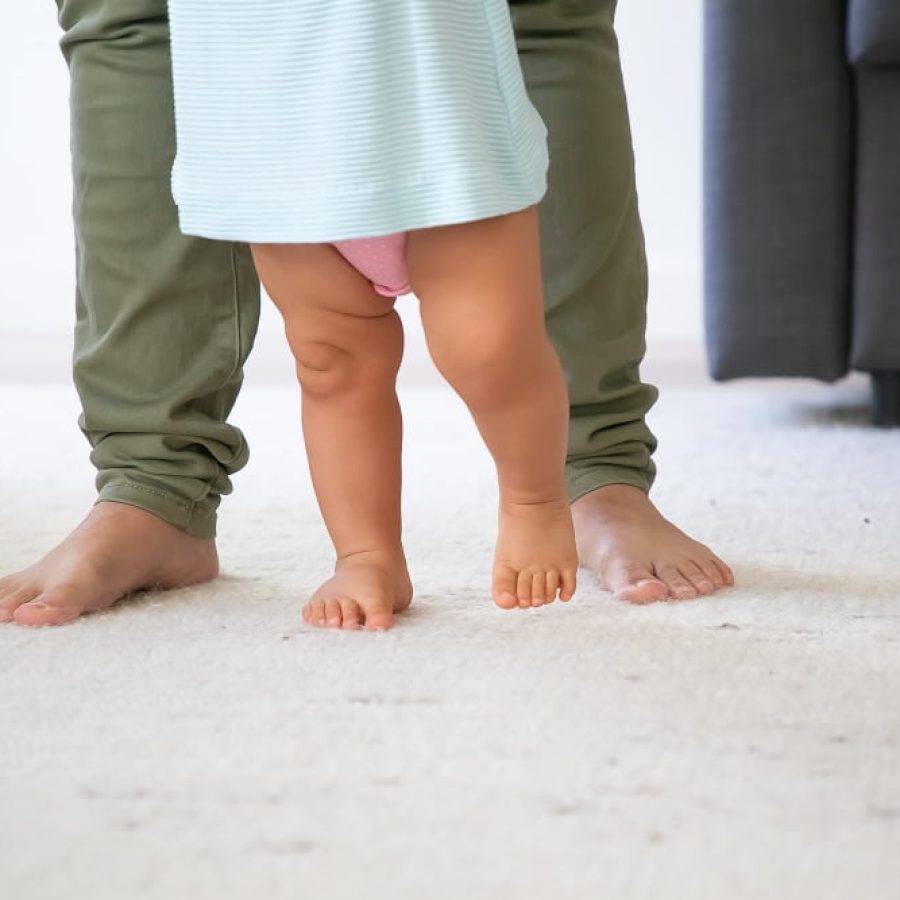A baby has several milestones set to be reached within their early years. Amongst so many life achievements, one might wonder when a baby should start walking. Although there are some physical indications that this moment is coming, yet again patience is key.
When should babies start walking?
Typically, babies start to take their first steps by the time they’re 9 to 18 months old. Might seem like a vast time frame, but this only goes to show that everyone has their own time.
As many other physical achievements, there’s a process behind that walking milestone. In most cases, babies will learn different ways to stand and support their bodies. As they gain strength and confidence, it’s only a matter of time until you have a walking cutie around the house!
Early signs of a baby learning to walk
Crawling and scooping: by this stage (7 to 10 months of age), the baby is developing their lower body conscience to move around. Still depends on their arms to propel themselves.
Pulling up to stand: can happen around 9 to 12 months of age. When the child has the strength to support their body on their legs, but not without any extra support (like someone holding their hands).
Cruising: when the baby moves around standing, but still holding on to some furniture or physical support. It’s observed on the 10th to 12th month.
My baby is not walking yet: should I be concerned?
Encourage your child to find their strength and challenge themselves. If you notice the little one is trying to stand on their own, don’t try to hold them – instead, stand by and offer your hand as a support only in case they lose their balance. But let them experiment and test their physical limits.
When to look for a doctor
Keep a close eye on any particular pattern, like difficulty in standing, supporting or moving a specific side of their body.
As mentioned before, there are some early signs to observe that point out that your child might be on their way to stand their own ground. If the child is recurrently showing any of those (cruising, crawling, creeping or even momentarily standing alone), is past or around their 15 month old age, but is not walking yet, there are no reasons to rush to a doctor.
Every child has their own time and journey in getting to know themselves and trusting their body. Encourage them to be active, playful, explore, and this will certainly have a positive effect on their self confidence.
Also, observe the way the baby falls and tries to get back up: if their legs seem stiff, it might be a good idea to set a medical appointment – even if just to rule out any motor or cognitive difficulty.
What to watch out for when your baby is learning to walk
- Encourage the child to stand on their feet – literally. Not wearing shoes can be beneficial for their muscle development. If it helps you feel safer, a non-slip sock can also be helpful.
- Every child has their own time. Don’t compare your kid’s development with others you might know of, since this can cause unnecessary pressure and anxiety both on you and, unconsciously, on the child as well.
- Don’t use baby walkers: those have been unadvised in different countries, including the US. Baby walkers can slow down motor development, negatively affect baby posture, and still contribute to domestic accidents – specially involving stairs.
By this time, you probably know that there is no magical formula around when a baby should start walking. But we also understand it’s normal to have some questions about your child’s development; how about continuing to learn and prepare yourself for this next important phase: how to potty train your child.


